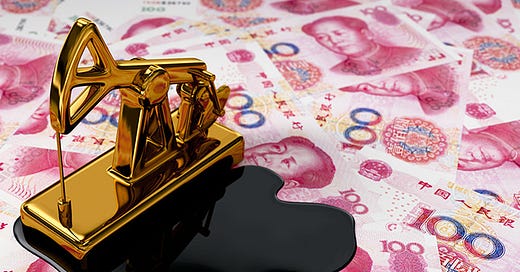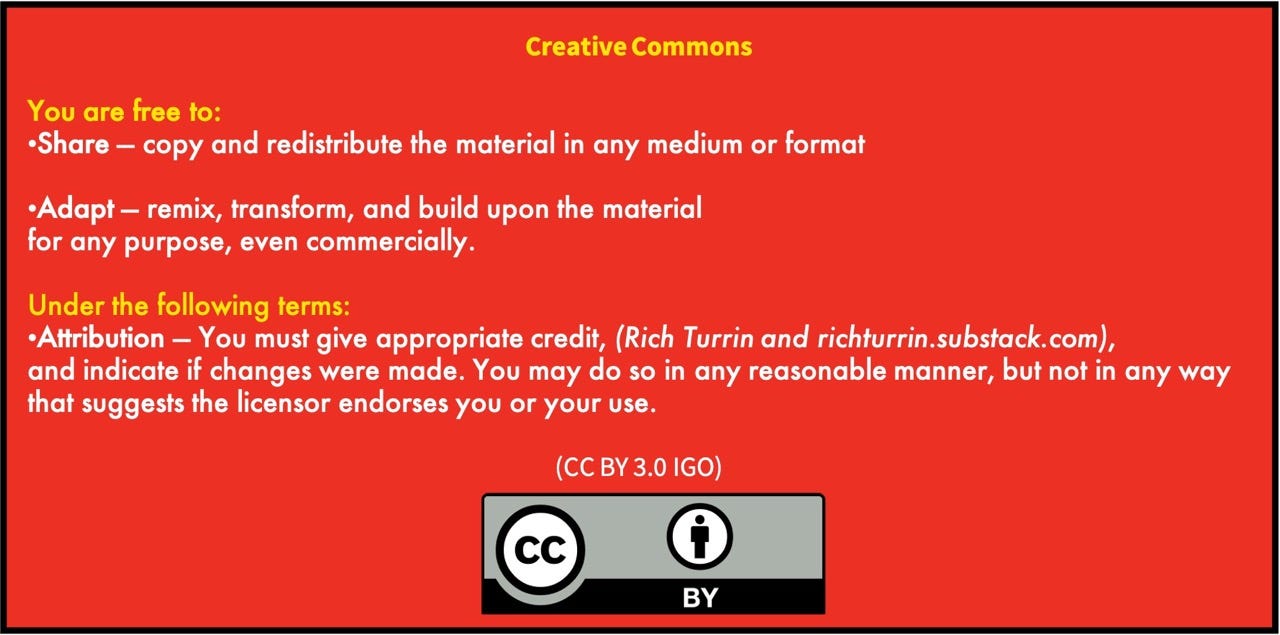China's digital yuan goes where Alipay and WeChat Pay never could, straight for the petrodollar!🛢
The digital yuan purchase of oil is a game-changer!
China just sent chills down the spine of US Fed Governors when PetroChina International Corp Ltd bought 1 million barrels of crude in digital yuan (e-CNY) last Thursday. In doing so, PetroChina completed the first-ever international crude oil trade to be settled in e-CNY at the Shanghai Petroleum and Natural Gas Exchange (SHPGX).
This is big news, but let me be clear from the start that it falls short of a cross-border transfer of e-CNY between China and a foreign buyer, but don’t worry, that’s coming soon.
The UAE’s agreement to cooperate on digital yuan and the new strategic relationship between the Bank of China and the UAE’s largest bank, First Abu Dhabi Bank (FAB) is telegraphing this event.
👉TAKEAWAYS:
The digital yuan, or e-CNY, was used to pay roughly US$90 million. Try that with WeChat Pay or Alipay!
PetroChina paid the exchange in digital yuan, likely settling with the seller’s accounts in China in digital yuan.
What this isn’t is a direct cross-border transfer between China and another oil-producing nation. Fed governors can sleep more easily.
This transaction is still important because it clearly shows the intent to settle with e-CNY on major commodities purchases; true cross-border trades come next.
By selling oil on the SHPGX, foreign oil suppliers are slowly breaking the US dollar’s monopoly on energy purchases.
SHPGX last week also did a major LNG trade with a French company, its second.
This is important for the digital yuan because it shows how it is being used in larger wholesale transactions.
Interestingly, China is forgoing rolling out a “wholesale” digital yuan and using a single CBDC for retail and wholesale transactions.
China’s digital yuan cooperation agreement between the Bank of China and the UAE’s FAB is another game-changer.
UAE will soon be a fellow BRICS nation and is also a founding member of m-BRIDGE, the CBDC transfer hub in Hong Kong.
👊STRAIGHT TALK👊
The SHPGX is China’s national energy trading platform, and its contracts are settled exclusively in Chinese yuan. The SHPGX intends to have its oil contracts in yuan become international standards, just like the New York Mercantile Exchange’s WTI “light sweet crude” and the Intercontinental Exchange’s “Brent contracts.”
That an undisclosed foreign seller opted to sell in yuan is news; that it went even further and used digital yuan is a jaw-dropper! The petrodollar is not under threat, but it can’t be ignored as a signal that at least some energy products will likely be traded in yuan in the future.
Settled in e-CNY
That the trade settled in e-CNY is significant. It shows how the PBOC uses the new digital yuan to settle larger valued payments. This oil contract for roughly US$90 million is the most recent; last week, there was a loan for US$20 million. This shows that the e-CNY is not just for buying coffee.
The primary benefit of using e-CNY on the SHPGX is that oil contracts can be settled immediately. That’s a breakthrough in a market where agreeing on a contract price can be followed by a long wait for the payment.
This also shows how the PBOC thinks of the e-CNY as a universal payment system that spans wholesale, usually between financial institutions, and retail payments. This is innovative and different from neighboring India’s CBDC or the EU’s, where separate retail and wholesale CBDCs are the norm.
The PBOC’s head of the Digital Currency Research Institute Mu Changchun spoke candidly about payment size and the division between wholesale and retail payments:
“Some people now believe that the retail scenario means that digital renminbi can only be used for small payments and not for large payments. In fact, the criterion for distinguishing wholesale and retail is not the amount.”
“Large-value payments are not necessarily wholesale payments; micropayments are not necessarily retail payments.”
“In fact, except for payment transactions between financial institutions, all other payment transactions between entities are retail. In other words, as long as one party is an individual, enterprise, institution, or government unit, all payment transactions are retail.”
Mu Changchun (via Google Translate, source: here)
France loves the SHPGX or dislikes the US
So far, the SHPGX offers contracts in LNG and Oil, and neither contract has seen much action so far. However, China’s mantra of “Build it, and they will come,” will likely pay off.
China surpassed the US as the world’s largest crude oil importer in 2017, with Saudi Arabia its largest supplier. Note that Saudi Arabia in January will become a BRICS member.
Saudi Arabia and the UAE will become BRICS nations in January. With BRICS’ clear goal to revalue trade into local currency one has to ask if –some– oil will be sold in yuan.
Two other significant foreign LNG trades have also been made on the platform, both by French companies. You are mistaken if you think this isn’t a political statement by the French government.
Last Thursday, China National Offshore Oil Corporation (CNOOC) and France’s Engie completed an international LNG trade for 65,000 tonnes from the UAE to be settled in yuan. This follows another CNOOC trade with TotalEnergies last March.
UAE will be a BRICS nation and a CBDC center
Almost as big as the e-CNY oil trade is that the United Arab Emirates and its largest bank, First Abu Dhabi Bank (FAB), signed cooperation agreements with China on the digital yuan.
The UAE is no stranger to the digital yuan or CBDC. It is a founding member of the mBridge CBDC transfer system in Hong Kong that is set to go online in 2024. As a leading financial center, the UAE loves CBDC and has even stated publicly that UAE corporates are happy to receive it in trade.
The UAE is a founding partner in the mBridge CBDC transfer system located in Hong Kong. MBridge is scheduled to come online in 2024 and as a fellow BRICS nation one has to wonder when, not if, it will start trading with China in digital yuan.
The UAE is also a key finance center for China in the Middle East with 60% of Chinese trade in the Middle East and North Africa passing through the nation.
That the UAE will someday process digital yuan payments for energy and other trade shouldn’t surprise anyone. The UAE will enter BRICS this January with Saudi Arabia, and it is anyone’s guess as to how long it will take for small trades in digital yuan to take place. When oil trades start flowing in e-CNY is anyone’s bet.
Conclusion:
I have been saying since I published Cashless back in 2021 that China’s digital yuan will be used for large-scale trade between Belt and Road Initiative Nations. Using digital yuan on the SHPGX to purchase oil is the first step. As an author, I am having an “I told you so” moment!
With the entry of UAE and Saudi Arabia into BRICS nations and the UAE’s participation in the mBridge CBDC transfer system, it’s just a matter of time before digital yuan trade in the region becomes normalized.
Who knows when the first cross-border digital yuan oil trade will occur, but at this point, few doubt that it will. My bet is in the next 18 months.
The digital yuan is a game changer with immediate settlement, smart contracts, and no connection to SWIFT. These traits are all valued by BRICS nations, and it’s just a matter of time before the digital yuan is widely circulated among them and to purchase oil.
Today’s news that SHPGX settled a contract in digital yuan is big, but tomorrow’s news that it purchased oil or gas directly from Saudi Arabia or the UAE will be explosive.
Do you think anyone in Washington is watching?
Subscribing is 100% free, you’ll be glad you did!
In the unlikely event you don’t like my newsletter, click unsubscribe at any time to “invite danger!”
My work is entirely supported by reader gratitude, so if you enjoyed this newsletter, please do both of us a favor and subscribe or share it with someone. You can also follow me on Twitter or Linkedin for more. For more about what I do and my media appearances, check out richturrin.com
Rich Turrin is the international best-selling author of "Cashless - China's Digital Currency Revolution" and "Innovation Lab Excellence." He is number 4 on Onalytica's prestigious Top 50 Fintech Influencer list and an award-winning executive previously heading fintech teams at IBM following a twenty-year career in investment banking. Living in Shanghai for the last decade, Rich experienced China going cashless first-hand. Rich is an independent consultant whose views on China's astounding fintech developments are widely sought by international media and private clients.
Please check out my books on Amazon:
Cashless: HERE
Innovation Lab Excellence: HERE










